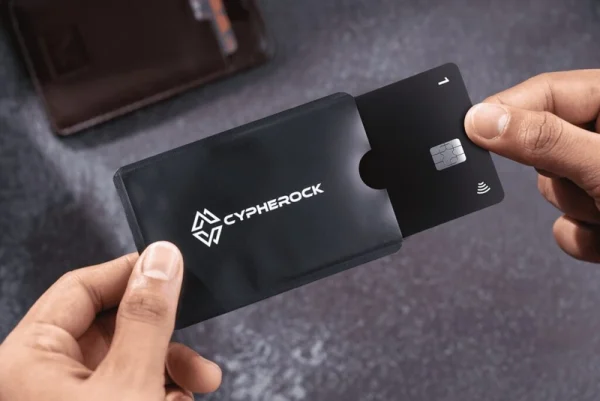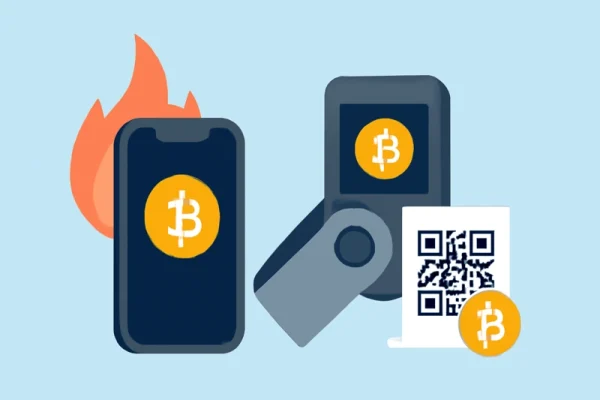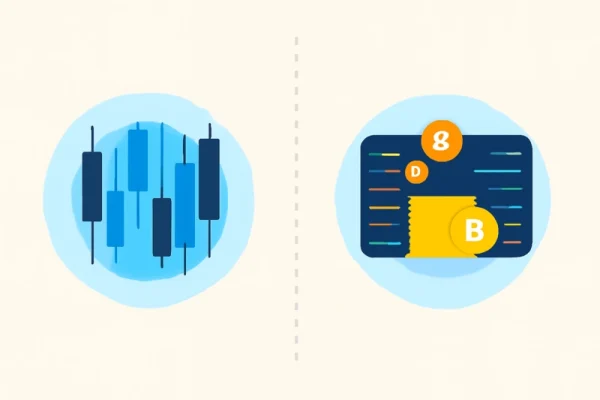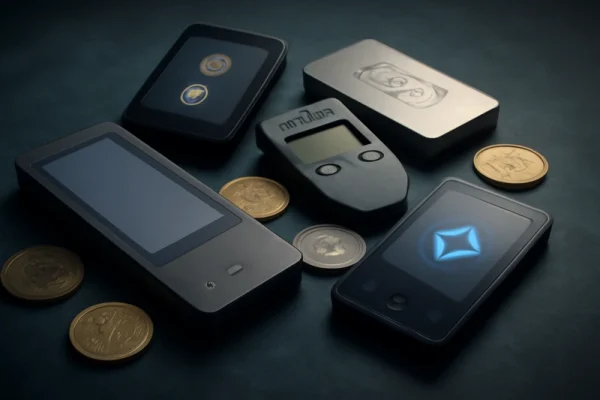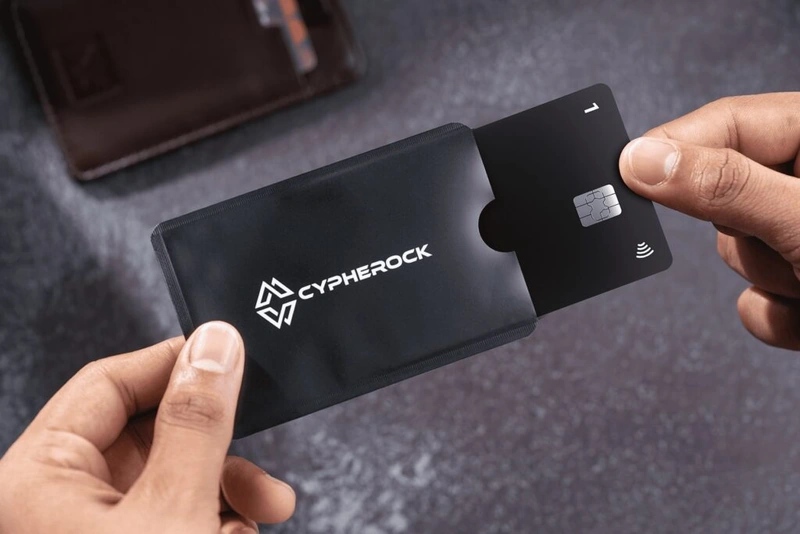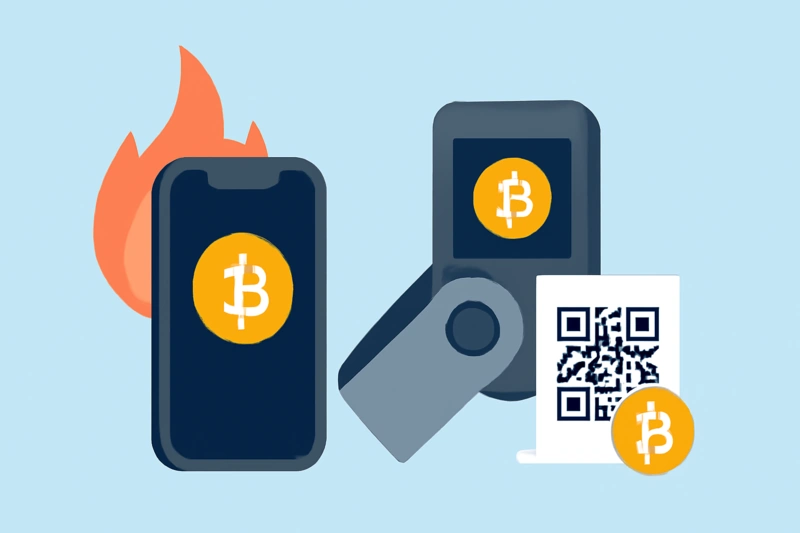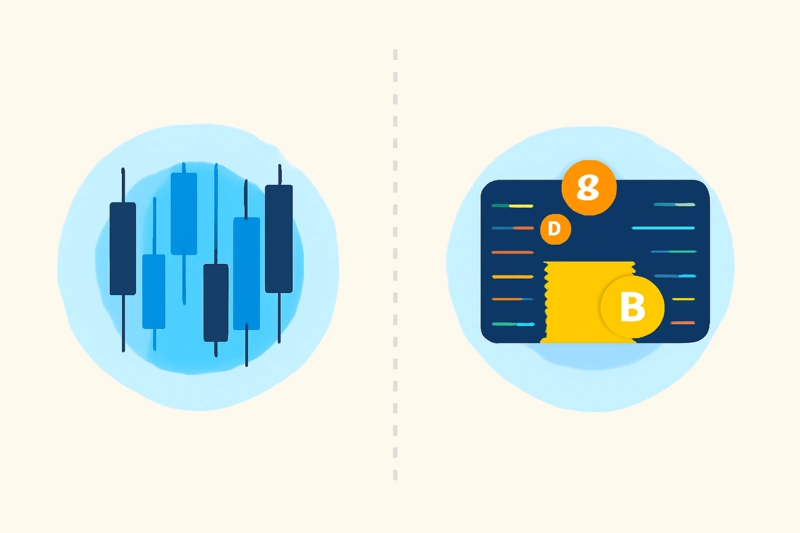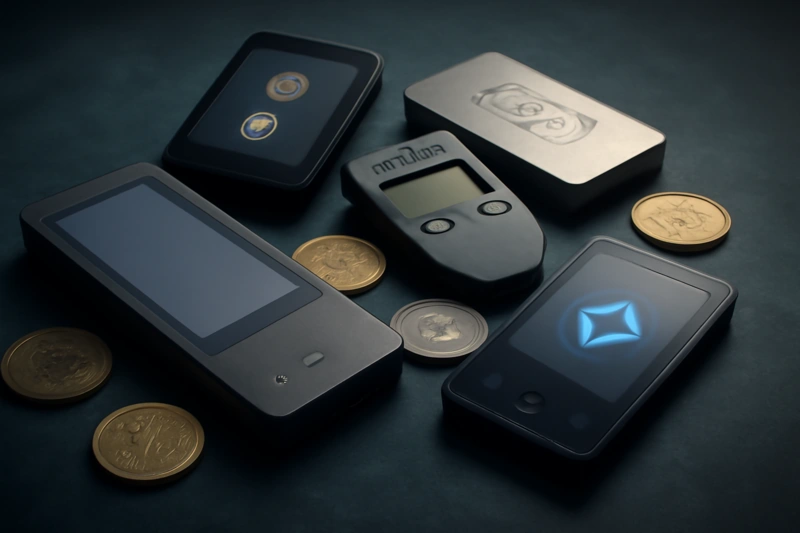The 12 Best Crypto Wallets of February 2026
There are a number of different crypto wallets available on the market, each with its own unique features and benefits. In this article, we will take a look at some of the best crypto wallets of February 2026 and help you find the one that's right for you.
Table of content
- List of Best Crypto Wallets:
- Best Hot Wallets of 2026
- Best Cold Wallets of 2024
- How Do We Choose the Best Crypto Wallets?
- Learn More About Cryptocurrency Wallets
- What Type of Wallet is Best for Me?
- What to Consider When Choosing a Crypto Wallet?
- Benefits of the Best Crypto Wallets
- Challenges With Cryptocurrency Wallets
- How to Set Up a Crypto Wallet?
- Why Should You Trust Us?
- Final Thoughts on Best Crypto Wallets
- FAQ About Crypto Wallets
List of Best Crypto Wallets:
Best Hot Wallets:
- Bybit – Best overall crypto wallet.
- Nexo – Best crypto wallet to earn interest.
- Crypto.com DeFi– Best DeFi crypto wallet.
- Exodus – Best for multi-platform use.
- Guarda – Best multi-currency wallet.
- MetaMask – Best Ethereum wallet.
- Electrum – Best wallet for Bitcoin.
- Trust – Best mobile crypto wallet.
- Coinbase – Best for easy access to DeFi.
Best Cold Wallets:
- Ledger – Generally best crypto cold wallet.
- Trezor – Best for advanced features.
- KeepKey – Best crypto wallet for beginners.
Best Hot Wallets of 2026
Below, we provide a list of the best cryptocurrency wallets:
Bybit Wallet

Bybit Wallet allows you to securely store, manage, and send your cryptocurrencies. Unlike Bybit's exchange wallet, Bybit Wallet grants you more control over your crypto holdings through a private key.
Type: Custodial wallet.
Supported currencies: Many cryptocurrencies, including popular ones like Bitcoin (BTC), Ethereum (ETH), USD Coin (USDC), and many more.
Cold storage conversion: Bybit Wallet doesn't directly offer cold storage conversion functionality.
Staking/DeFi Support: Bybit Wallet doesn't offer built-in staking or DeFi functionalities.
Key features: Bybit allows you to hold your own crypto keys for more control over your funds. You can also interact with DeFi platforms, NFTs, and other dApps easily.
Nexo Wallet
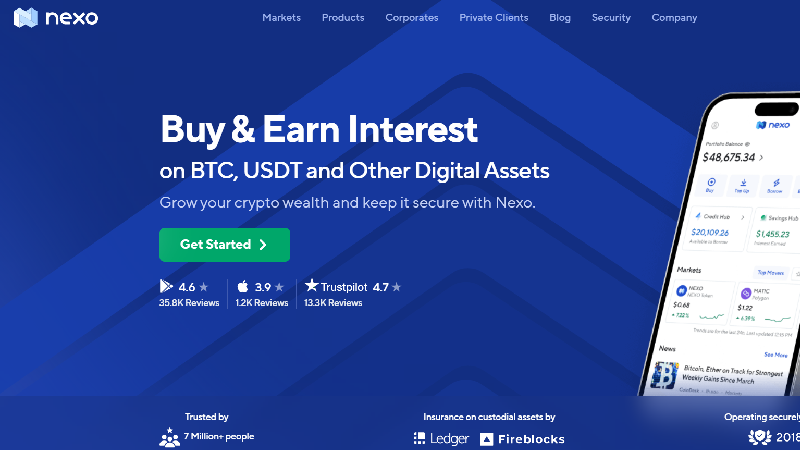
Nexo Wallet allows you to store, manage, and earn interest on your crypto holdings. It integrates with the Nexo platform's other features like borrowing and their crypto card.
Type: Non-custodial wallet.
Supported currencies: Nexo Wallet currently supports many popular cryptocurrencies and tokens, including Bitcoin (BTC), Ethereum (ETH), stablecoins like USDC and USDT, and various DeFi tokens.
Cold storage conversion: Nexo Wallet itself doesn't directly function as cold storage. However, it lets you connect your existing hardware wallet (a separate physical device) for enhanced security. This provides the benefits of a non-custodial wallet with the added protection of cold storage.
Staking/DeFi support: While Nexo offers its own interest-earning products, Nexo Wallet integrates with the Compound protocol. This lets you participate in certain DeFi liquidity pools directly through the wallet interface, potentially earning higher returns on your holdings.
Key features: Non-custodial security, supports multiple blockchains, integrated exchange, Nexo Card compatibility.
Crypto.com Defi Wallet

Crypto.com offers two distinct wallets for managing your cryptocurrency holdings:
The Crypto.com App: This is a custodial wallet, meaning Crypto.com holds the private keys to your crypto on your behalf. It's a good option for beginners due to its user-friendly interface and ease of use.
Crypto.com DeFi Wallet: This is a non-custodial wallet, where you hold the private keys yourself. It offers more control over your funds but requires a greater understanding of crypto security.
Here's a breakdown of key features for each:
Crypto.com App Custodial Wallet
Type: Custodial wallet
Supported Currencies: Over 250 cryptocurrencies and tokens (including Bitcoin, Ethereum, and popular stablecoins)
Cold Storage Conversion: While not directly a cold storage solution, Crypto.com stores a significant portion of user funds in cold storage for added security.
Staking/DeFi Support: Offers some staking options for select cryptocurrencies to earn interest. Compared to the DeFi wallet, it has limited DeFi functionality.
Key features: User-friendly interface for buying, selling, and trading crypto, Competitive trading fees with CRO token discounts, Earn interest on select currencies through staking integrated Visa debit card to spend crypto
Crypto.com DeFi Wallet (Non-Custodial Wallet)
Type: Non-custodial wallet
Supported Currencies: Over 700 tokens across 20+ blockchains (wider range than the app)
Cold Storage Conversion: You can transfer your crypto to a separate hardware wallet for true cold storage.
Staking/DeFi Support: Extensive DeFi functionalities, allow you to participate in various DeFi protocols like lending, borrowing, and liquidity pools for potentially higher returns.
Key features: Maximum control over your private keys and crypto, Access to a wider range of DeFi applications, Support for multiple blockchains and tokens, Built-in NFT storage and swap functionality
Exodus
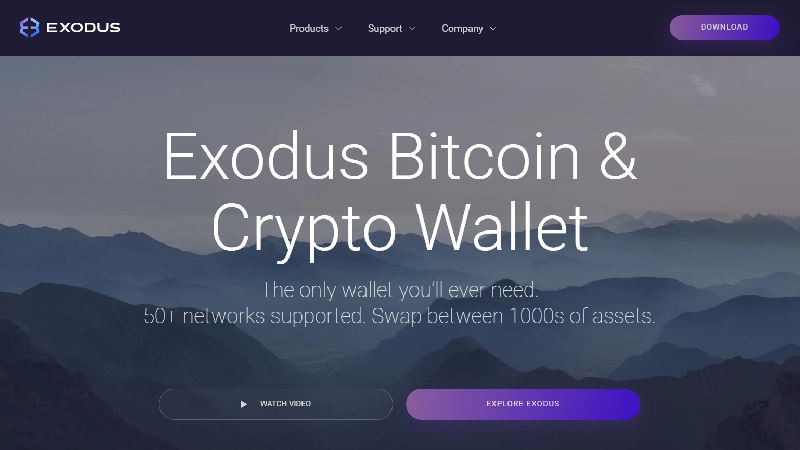
Exodus Wallet is a non-custodial cryptocurrency wallet that allows users to store, send, receive, and swap cryptocurrencies. It is available as a desktop app for Windows, Mac, and Linux, as well as mobile apps for iOS and Android.
Type: Desktop and mobile wallet
Supported devices: Desktop (Windows, Mac, Linux) and mobile (iOS, Android)
Supported currencies: Exodus currently supports 250+ assets, including Bitcoin, Ethereum, Litecoin, and more
Can convert to cold storage: Yes, by integrating with hardware wallets
Staking/DeFi support: Yes
Key features: Non-custodial, secure, easy to use, staking support, DEX support, NFT support, Web3 explorer
Guarda
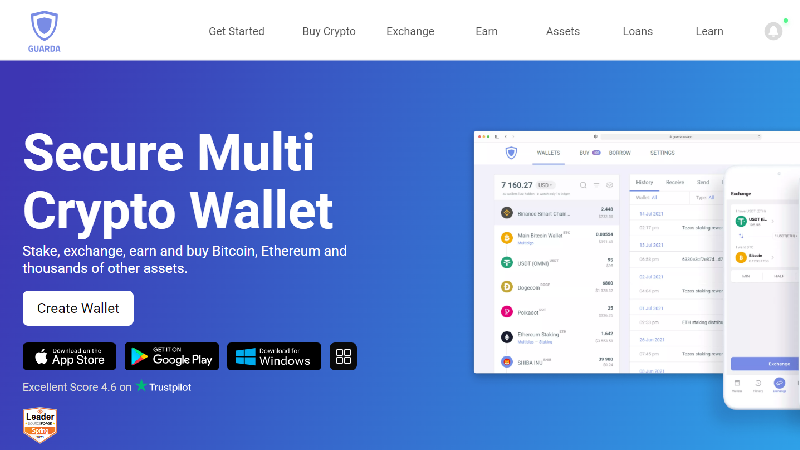
Guarda Wallet is a non-custodial multi-currency wallet that enables you to manage and trade your digital assets securely on the go. It’s best for crypto asset investors. With its web and mobile applications, Guarda enables users to have an optimal crypto storage experience.
Type: Multi-platform wallet
Supported devices: Web app, iOS, Android, Windows, macOS
Supported currencies:: Over 10,000 cryptocurrencies, including Bitcoin, Ethereum, Litecoin, and more
Can convert to cold storage: Yes, by integrating with hardware wallets
Staking/DeFi support: Yes
Key features: Non-custodial, secure, multi-platform, widely supported, staking and DeFi support, cross-chain swaps, NFT support
Metamask

MetaMask Wallet is the best Ethereum wallet. It is a web browser extension and mobile app that allows users to store, send and receive digital assets, and interact with decentralized applications (DApps) built on the Ethereum blockchain. It is one of the most popular cryptocurrency wallets, with over 21 million monthly active users worldwide.
Type: Web browser extension and mobile app
Supported devices: Web browsers and mobile devices
Supported apps: Metamask connects you to more than 3700 apps
Can convert to cold storage: Yes, by integrating with a hardware wallet
Staking/DeFi support: Yes, for ETH and other supported cryptocurrencies
Electrum

Electrum Wallet is one of the best non-custodial wallets. It’s free and the best Bitcoin wallet that is available for Windows, Mac, Linux, Android, and iOS. It is a lightweight and fast wallet that is easy to use, even for beginners.
Type: Desktop and mobile wallet
Supported devices: Desktop (Windows, Mac, Linux) and mobile (Android, iOS)
Supported currencies:: Bitcoin (BTC)
Can convert to cold storage: Yes, by using a hardware wallet
Staking/DeFi support: No
Key features: Lightweight and fast, easy to use, secure, non-custodial, multi-signature wallets
Trust Wallet
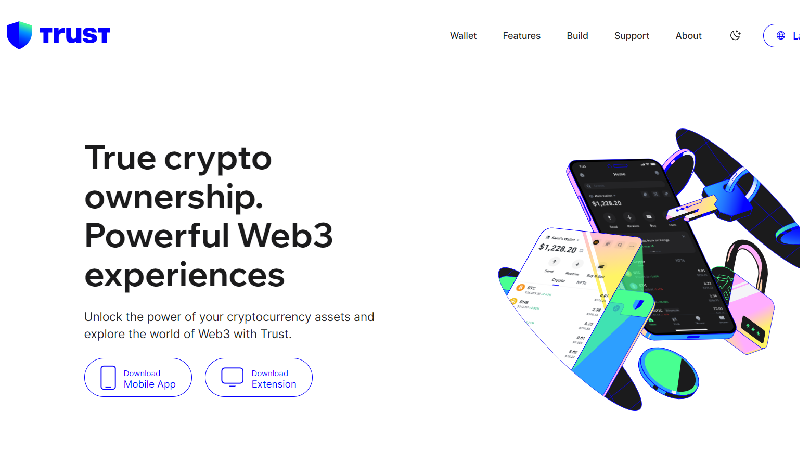
Trust Wallet is a non-custodial wallet that enables users to store, send, receive and swap cryptocurrency assets securely. It is one of the best mobile crypto wallets and is available for both mobile devices and as a browser extension.
Type: Mobile and browser extension wallet
Supported devices: Mobile (iOS, Android) and browser extensions (Chrome, Firefox, Brave)
Supported currencies: Over 100k+ cryptocurrencies and 100 blockchains
Can convert to cold storage: Yes, by integrating with hardware wallets
Staking/DeFi support: Yes
Key features: Non-custodial, secure, easy to use, compatible with Wallet Connect, cross-chain swaps/bridges, NFT support
Coinbase

Coinbase Wallet is a non-custodial cryptocurrency wallet. It is the best wallet to store crypto that enables users to store, send, receive, and trade cryptocurrency assets. It is available as a mobile app for iOS and Android devices, as well as a web app that can be accessed on any device.
*Don’t mix it with Coinbase exchange. This Coinbase Wallet is for Web3 and is non-custodial.
Type: Mobile and web app wallet + non-custodial
Supported cryptocurrencies: Over 90 cryptocurrencies and 70,000 tokens
Can convert to cold storage: Yes, by integrating with hardware wallets
Staking/DeFi support: Yes
Key features: Non-custodial, secure, easy to use, compatible with Coinbase, supports NFTs
Best Cold Wallets of 2024
Below, we provide a list of the best cold wallets.
Ledger
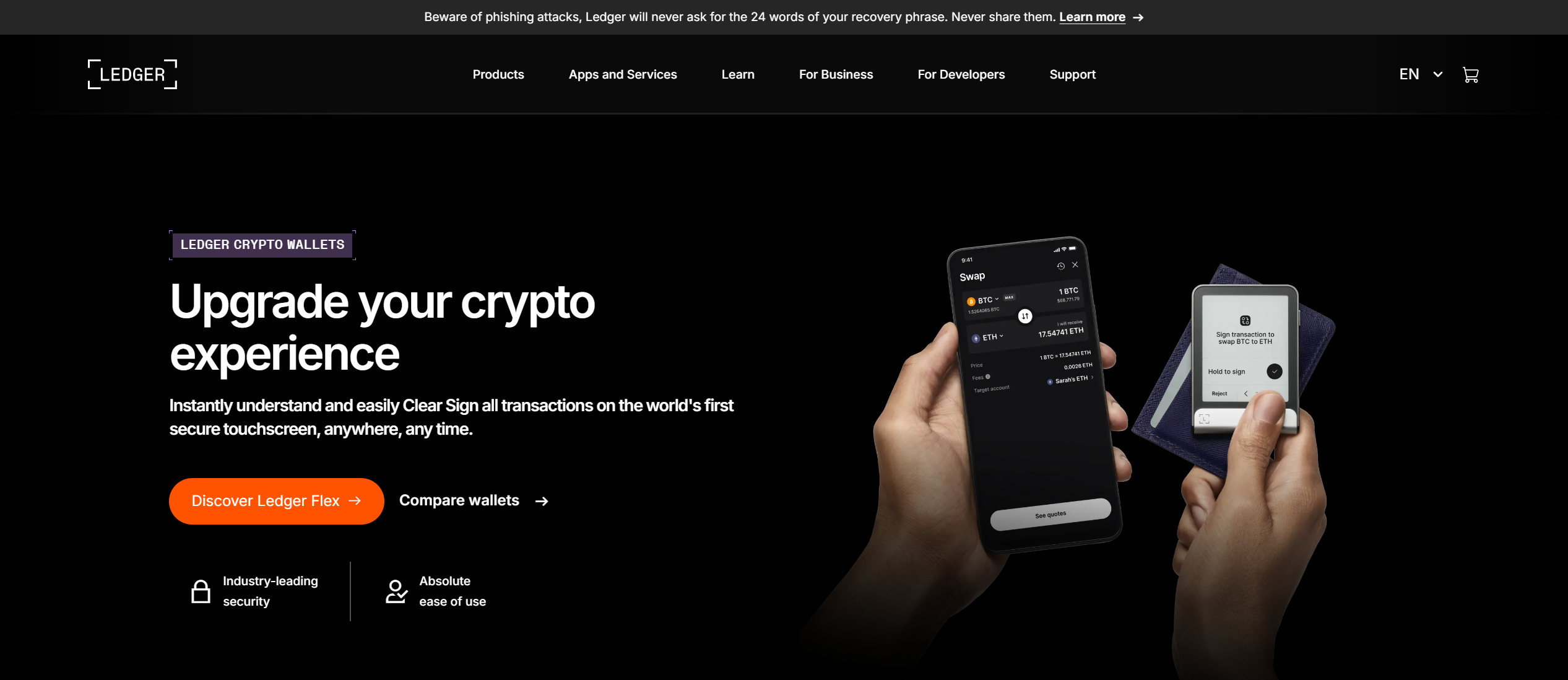
Ledger Wallet Ledger empowers you to take absolute control of your financial future with the most secure, transparent, and user-friendly solution available. Choose Ledger for unparalleled protection against evolving threats, ensuring your crypto remains yours, and yours alone.
Type: Hardware wallet
Supported cryptocurrencies: Ledger devices support the widest array of cryptocurrencies and tokens, including Bitcoin, Ethereum, and NFTs, all secured by our industry-leading architecture
Can convert to cold storage: Yes, Ledger Wallet is a cold storage device
Staking/DeFi support: You can stake natively from Ledger Live
Key features: Ledger's in-house security team, Donjon, is composed of world-class security researchers and experts with extensive experience in cryptography, software, and hardware security. Ledger also offers a unique security key, secure screens, Ledger Live ecosystem, and broad crypto support.
Trezor
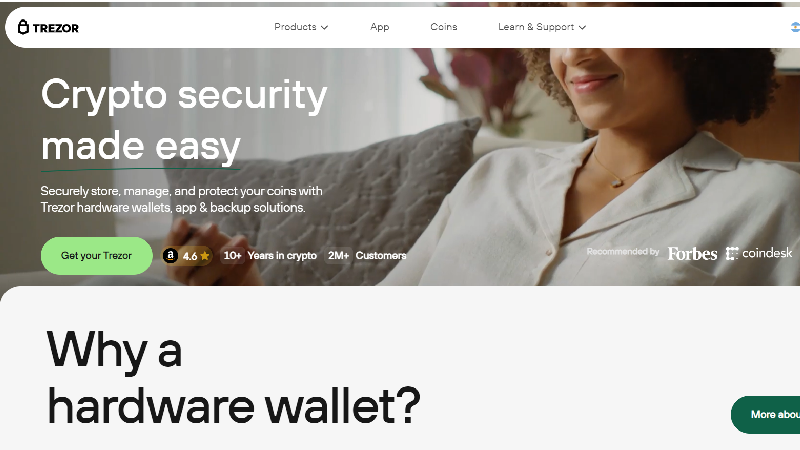
Trezor Wallet is a popular hardware wallet that allows you to securely store your cryptocurrency offline. The Trezor Model T is the latest and most advanced model, featuring a touchscreen display for easy navigation.
Type: Hardware wallet
Supported cryptocurrencies: 8987 supported coins & tokens, including Bitcoin, Ethereum, Litecoin, and more
Can convert to cold storage: Yes, the Trezor Wallet is a cold storage device
Staking/DeFi support: No, but you can connect to other wallets that support staking and DeFi
Key features: Secure, easy to use, widely supported, secure chip, recovery phrase
KeepKey
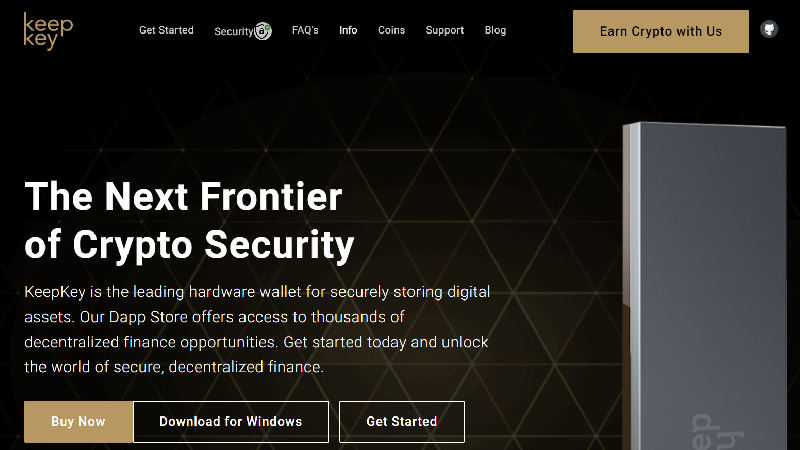
KeepKey Wallet is the best cold wallet for beginners that allows you to store your cryptocurrency offline, protecting it from online theft and malware. It is one of the oldest hardware wallets on the market, and it has been praised for its ease of use and security.
Type: Hardware wallet
Supported cryptocurrencies: 7217 cryptocurrencies, including Bitcoin, Ethereum, Litecoin, and 348 Supported Blockchains
Can convert to cold storage: Yes, KeepKey is a cold storage device
Staking/DeFi support: No, but you can connect to other wallets that support staking and DeFi
Key features: Secure, easy to use, widely supported, secure chip, recovery phrase
How Do We Choose the Best Crypto Wallets?
We conduct a thorough research, taking into account the following factors:
- Security: We looked at each wallet regarding its security, including two-factor authentications and recovery phrases.
- Ease of use: We considered the wallet's ease of use by assessing its user interface and navigability. We also looked at the availability of learning resources and customer support.
- Features: We touched on the number of cryptocurrencies supported, their staking and DeFi support, cross-chain swaps, NFT support, multi-platform support, and many other features of each wallet described in our review.
So, we chose the wallets that scored the highest in these categories. These wallets are the best options for protecting your cryptocurrency and managing your crypto assets.
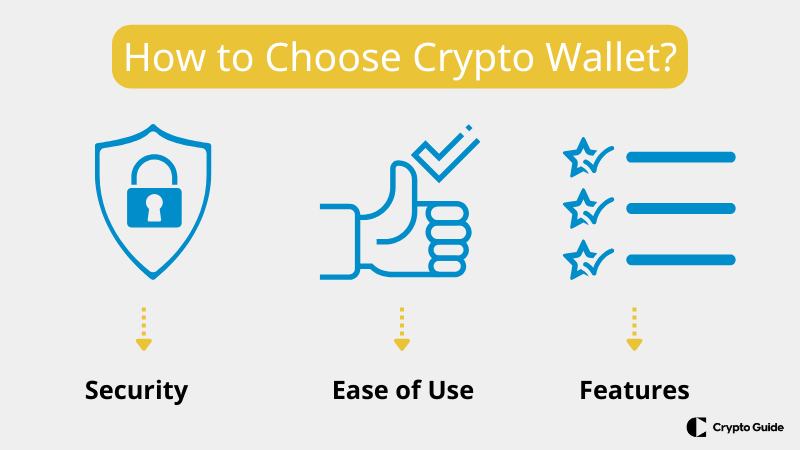
Learn More About Cryptocurrency Wallets
Crypto wallets are the tools that should come in handy if a user wants to buy, sell, or store cryptocurrency. They, therefore, do the job of a safe box for your digital possessions, allowing you, in this case, access to and conveniently manage your crypto capital.
How Do Crypto Wallets Work?
Your cryptocurrency remains stored in crypto wallets in the form of public and private keys. These keys serve as unique identifiers linked to the address of your cryptocurrency.
The public key is like your cryptocurrency address, a visible identity to whom you are giving your cryptocurrency. In simple terms, it is actually just like your home address, where you receive mail.
The private key can be compared to a physical house key—kept secret and known only to you. A private key is the permission one must have to be able to spend the cryptocurrency that belongs to the address.
When you send cryptocurrency, you're more or less signing off the transaction with your private key so that only you can give authority for those funds to be transferred. It gets validated for the transaction via the recipient's public key and ensures it reaches the intended destination.
Types of Crypto Wallets
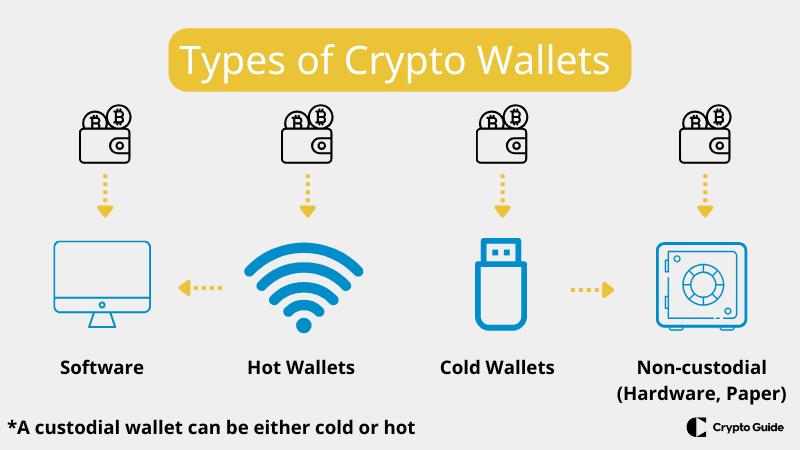
Hot wallets: Online private keys in software programs (web, mobile, desktop). More convenient but higher attack risk.
Cold wallets: Offline hardware devices (e.g., Ledger Nano X, Trezor Model T) for private keys. Higher security but less convenient.
Custodial Wallets: Third-party managed wallets. Convenient with added services (e.g., trading), but users lack private key control, increasing security risks.
Non-Custodial Wallets: Users control and store their own private keys. Full control over assets but requires careful key management.
Software Wallets: Online programs for storing cryptocurrency keys (desktop, smartphone, web). Convenient but less secure.
Hardware Wallets: Offline devices for storing keys. Highly secure; private keys are never online, preventing hacking.
Paper Wallets: Physical paper with printed private keys.
What Type of Wallet is Best for Me?
Selecting the appropriate type of crypto wallet depends on individual needs and risk tolerance.
Note: All hardware wallets are more secure than regular ones, however, it’s important to keep seed phrases secured and never reveal them.
Hot wallets are the most convenient to use since they are software that stays online, but at the same time, they are the least secure wallets.
Cold wallets represent physical devices that store keys offline, thus offering the most security and being best for large, long-term holdings.
Custodial Wallets are convenient but less secure, suitable for those who feel unpleasant managing their keys. Non-custodial wallets, on the other hand, store keys on your device and are, therefore more secure but less convenient.
The hardware wallets store the keys physically offline, thus affording top security.
Software wallets, on the other hand, are usually general and flexible, and they may or may not belong to a custodial group. It fits the users who complete hundreds of crypto transactions regularly.
Paper wallets are offline, and secure, but inconvenient for everyday use. This makes paper wallets suitable for the storage of tokens in the long run.
What to Consider When Choosing a Crypto Wallet?
Being the right crypto wallet is like safeguarding your digital assets. Here are the following considerations for choosing a wallet:
- Security Type: There would be a preference for a non-custodial wallet whereby you own the private keys. Though custodial ones are easy to use, they are third-party storage and, therefore, lax in security.
- Security features: Choose a wallet that has strong security features, such as multi-factor authentication (MFA), encryption, and hardware security modules (HSMs).
- User Interface: The wallet you choose best meets your experience level through an intuitive and user-friendly interface.
- Supported Platforms: Think of your best device and operating system support. Some wallets have cross-platform support, so you can easily access them from any device.
- Coin coverage: Ensure the wallet you intend to use can support the cryptocurrencies you wish to store. Most wallets usually support the major coins, but some have scope in some blockchains or specific niche altcoins.
- Future compatibility: Make sure that the wallet is actively developed and that new cryptocurrencies that may show up on the market are supported in the future.
- Fiat Conversion: Purchase your crypto with your credit card.
- Staking and DeFi DeFi Wallet Integration: In case you are interested in staking or DeFi (decentralized finance), then you can check out wallets that offer support for staking and DeFi.
- Reputation of Wallet: Look through the reputation of the wallet provider. This includes the security and support records. Read user reviews and industry reports in order to know if this service is credible.
- Community engagement: Join online communities and forums like Reddit, related to your wallet, for insight from experienced users and possible concerns.
- Initial Cost: Establish the wallets, especially those of hardware wallets where upfront costs may be incurred.
- Maintenance costs: Beware of the case of recurrent charges or subscription fees for any cloud-based or premium features. Remember, safety comes first. Take the time to choose a wallet that puts the user's security at the top and leaves nothing but peace of mind.
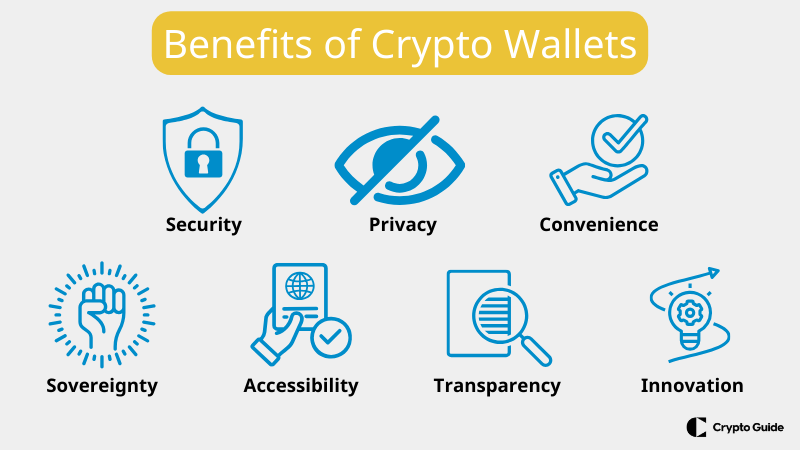
Benefits of the Best Crypto Wallets
Cryptocurrency wallets offer a range of benefits to users:
- Security: Cryptocurrency wallets have been designed in such a way that they will secure your cryptocurrency from theft or the collapse of exchanges. They secure coins through many security tactics such as encryption and two-factor authentications.
- Privacy: They help you maintain your privacy. Contrary to the need for providing your personal information to a third party in a traditional banking system, with a cryptocurrency wallet, you are in control of your privacy.
- Convenience: Such a wallet provides easy sending, receiving, and storage convenience. That also means that you can transact from anywhere around the world if you have a wallet. You can use it for payments either by online mode or through in-person transfer.
- Sovereign: All the security and control of the cryptocurrency is placed in your hands. Thus, you are not reliant on some third-party service but sovereign to make use of your coins whenever.
- Accessibility: They are accessible from various devices, including computers, smartphones, and tablets. Hence, you can access your coins from anywhere in the world.
- Transparency: Cryptocurrency establishes a decentralized ecosystem to all users; there is no one controlling the system. This means it is more transparent compared to the conventional banking systems.
- Innovation: This makes the industry of cryptocurrency one of the most innovative and fast-growing industries in the world. Therefore, in the world of cryptocurrency wallets, something new and exciting is always opened.
The top crypto wallets generally offer a range of benefits that make them invaluable tools for anyone looking to use crypto.
Challenges With Cryptocurrency Wallets
Some of the risks that cryptocurrency wallet users are exposed to include:
- Losing Funds and Other Risks: The most significant security concern for crypto wallets is losing funds, be it due to hacking, phishing, or human error. The biggest danger is if the malware can lose access to funds for the user. And if he forgets the password of his account or he needs to take more care of the private key, he can gain access to his funds.
- Complexity and Technical Know-How: Cryptocurrency wallets can be very complex, especially for a beginner. Some of the wallets require one to be in a position of great technical know-how, and it becomes hard for a user to understand how they can send, receive, or securely store their coin.
- Limited functionality: In such crypto wallets, you may end up with very few specific cryptocurrencies in place. These are actually quite inconvenient for those who, say, need to store a number of coins with themselves.
- Accessibility: A person may not be in a position to easily access the cryptocurrency wallets, as they would also need a computer or smartphone for the same. Some may be working under some specific operating systems while others would not be compatible with your device.
- Education and Awareness: Most people don't know that there are wallets for cryptos, thus only a few even understand the risks. So, it would make sense to first collect the details about the wallet before using them.
Nevertheless, despite all these challenges, cryptocurrency wallets are a very handy tool. If a person properly understands associated risks and then ensures due protection for one's wallet, that person will be able to enjoy the benefits of using cryptocurrency.
How to Set Up a Crypto Wallet?
Hot Wallets
Hot wallets are directly connected to the internet with the help of software. They are useful in everyday use but are more prone to hacks.
The following are the steps in setting up a hot wallet:
- Hot wallet provider: There are various hot wallet providers out there, and one should select the most reliable and, of course, the one that has high ratings in terms of safety. Hot wallet providers can range from widely known providers such as Blockchain.com and MetaMask.
- Download and install the wallet software: The hot wallet provider gives you a link from where you can download and install their wallet software. The installation could be on your computer or even on your mobile device. Always double-check if the link is secure.
- Create a recover phrase: A recovery phrase contains either 12 or 24 words to make a backup of your wallet. In the case of device loss or password forgetfulness, a recovery phrase is what would enable you to recover the wallet. Please ensure that you jot it down on paper and keep it somewhere safe. It’s recommended to have a few backups in case of fire or water damage.
- Fund your Wallet: After setting up the wallet, fund it with some cryptocurrency by transferring from another wallet or an exchange.
Cold Wallets
Cold wallets are an offline mode of physical storage of your cryptocurrency keys. Therefore, the security that cold wallets provide is the most secure one.
Steps to set up a cold wallet:
- Choose your cold wallet provider: There are a number of cold wallet providers, but the most popular are Ledger and Trezor.
- Purchase a cold wallet: The product is available from the seller's website or other popular retailers. Now let's get down to installing a cold wallet. When it's at hand, you have to connect the device, proceed by the setup prompts, and offline generate a seed. Remember to check if all the original safety stickers are on the box and the device. If anything is damaged, contact the seller or the device’s company to get advice on what to do next.
Transfer Your Cryptocurrency to Your Cold Wallet: Now that you have successfully activated your cold wallet, next is the opportunity to transfer some cryptocurrency of your choice from another wallet or exchange into it.
Why Should You Trust Us?
Here are some reasons why you should trust us for our wallet recommendations:
- We are a team of cryptocurrency experts, with years of professional experience in the domain. Our team members have been studying and researching the use of cryptocurrency for years, and they know very well about the various kinds of wallets in the market.
- Our suggestions are based on objective analysis. We have no financial relations with any of the wallets mentioned, we can give you objective advice.
- We continuously update our recommendations. The cryptocurrency space is very dynamic, and we always update our recommendations occasionally to accommodate the latest unfolding in the space.
But that's not the only reason; we have every commitment to provide you with the right and latest information about your cryptocurrency wallets. We are constantly engaged in research to find new wallets and make timely editing recommendations. We also have the help of user feedback to guide us in improving the same.
Final Thoughts on Best Crypto Wallets
The best crypto wallets are those that align with your specific needs and risk tolerance. For frequent access to your cryptocurrency, hot wallets like Nexo or Bybit are ideal, offering convenience and ease of use. However, if security is your top priority, consider cold wallets such as Ledger, Trezor, or Keepkey, which provide superior protection for your assets. Choose the wallet that best matches your lifestyle and security preferences to ensure your crypto holdings are both accessible and secure.
